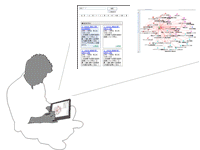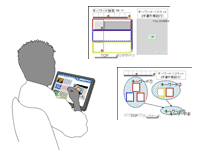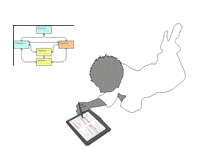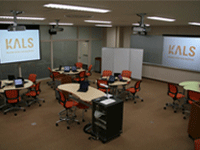MEET Projects
Here you can get a full picture of Our Projects
MEET Course Catalogue
 Course Catalogue published by the Center for Research & Development of Higher Education is now available online since April 2007.
Course Catalogue published by the Center for Research & Development of Higher Education is now available online since April 2007.
MEET Course Catalogue is a collection of course syllabus for junior and senior students. The first volume was published in 2005 and has been used among students especially who take courses offered by the other departments.
This online catalog enhances students' search capability and provides them with more course information. It enables students to utilize the catalogue in a variety of ways. One feature of the online catalogue is the visualization technology that portrays course relations across the departments and schools. This project is supported by one of the major projects for the University of Tokyo that are articulated in “Action Plan 2006” by our president.
MEET Video Explorer
 MEET Video Explorer is a software that supports students search for video clips from our TV program archive.
MEET Video Explorer is a software that supports students search for video clips from our TV program archive.
This application software has keyword search function, video viewer, mapping tool with a color pallet to visualize the relation of selected clips, comment and grouping function for these clips to navigate users to explorer the area of interest or issue domain, and generate a multimedia map. This application was developed specifically in order to search for TV programs.
TV broadcasting and archives have been capturing society and culture over generations from various perspectives by reflecting situations during each era to add a fresh dimension. From this insight, MEET aims at creating a system to focus attention to the close intersection of society, culture, and the areas of students’ research interests. The formative evaluation will be performed during experiment classes using the software to validate its effectiveness.
MEET eJournal plus
 MEET eJournal Plus is a learning environment to support learning activities by enhancing critical reading and analytical thinking. Past research projects have focused on students’ reading and understanding proficiency. In this project, students are to read articles and books analytically, recognize their perspectives, and state their opinions.
MEET eJournal Plus is a learning environment to support learning activities by enhancing critical reading and analytical thinking. Past research projects have focused on students’ reading and understanding proficiency. In this project, students are to read articles and books analytically, recognize their perspectives, and state their opinions.
This software application will be equipped with underline and comment function for e-documents, concept mapping tool to organize sentences and paragraph structures, and report editor combined with the concept map. The formative evaluation will be performed during experiment classes using the software to validate its effectiveness. The prototype application willl be evaluated in the experiments in this later semester.
KALS: Komaba Active Learning Studio
 Komaba Active Learning Studio (KALS) is the first ICT classroom designed for collaborative learning in The University of Tokyo. This classroom was established in 2007 MAY and the operation has started.
Komaba Active Learning Studio (KALS) is the first ICT classroom designed for collaborative learning in The University of Tokyo. This classroom was established in 2007 MAY and the operation has started.
KALS allows the instructor to arrange and change the classroom layout of student tables and chairs, and a variety of lectures such as discussion, group work, desktop experiment, and media construction are feasible. Moreover, this classroom is equipped with tablet-PCs and personal response devices enough for each students, and therefore the instructor can utilize those tools and enhance class flexibility and also interactivity. MEET cooperates in the effective use of tablet-PCs and the classroom operation.

